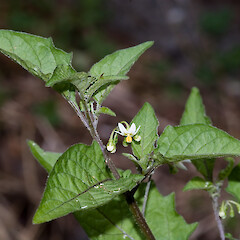Solanum nigrum
Common name
black nightshade
Family
Solanaceae
Flora category
Vascular – Exotic
Structural class
Herbs - Dicotyledons other than Composites
NVS code
The National Vegetation Survey (NVS) Databank is a physical archive and electronic databank containing records of over 94,000 vegetation survey plots - including data from over 19,000 permanent plots. NVS maintains a standard set of species code abbreviations that correspond to standard scientific plant names from the Ngä Tipu o Aotearoa - New Zealand Plants database.
SOLNIG
Conservation status
Not applicable
Wetland plant indicator status rating
Information derived from the revised national wetland plant list prepared to assist councils in delineating and monitoring wetlands (Clarkson et al., 2021 Manaaki Whenua – Landcare Research Contract Report LC3975 for Hawke’s Bay Regional Council). The national plant list categorises plants by the extent to which they are found in wetlands and not ‘drylands’. The indicator status ratings are OBL (obligate wetland), FACW (facultative wetland), FAC (facultative), FACU (facultative upland), and UPL (obligate upland). If you have suggestions for the Wetland Indicator Status Rating, please contact: [Enable JavaScript to view protected content]
FACU: Facultative Upland
Occasionally is a hydrophyte but usually occurs in uplands (non-wetlands).
Flower colours
White, Yellow
Year naturalised
1853
Origin
Eurasia
Etymology
solanum: Derivation uncertain - possibly from the Latin word sol, meaning “sun,” referring to its status as a plant of the sun. Another possibility is that the root was solare, meaning “to soothe,” or solamen, meaning “a comfort,” which would refer to the soothing effects of the plant upon ingestion.
nigrum: Latin meaning black
Poisonous plant
Often mistaken for deadly nightshade. Recorded as being moderately toxic if eaten. The black berries are not very toxic.











